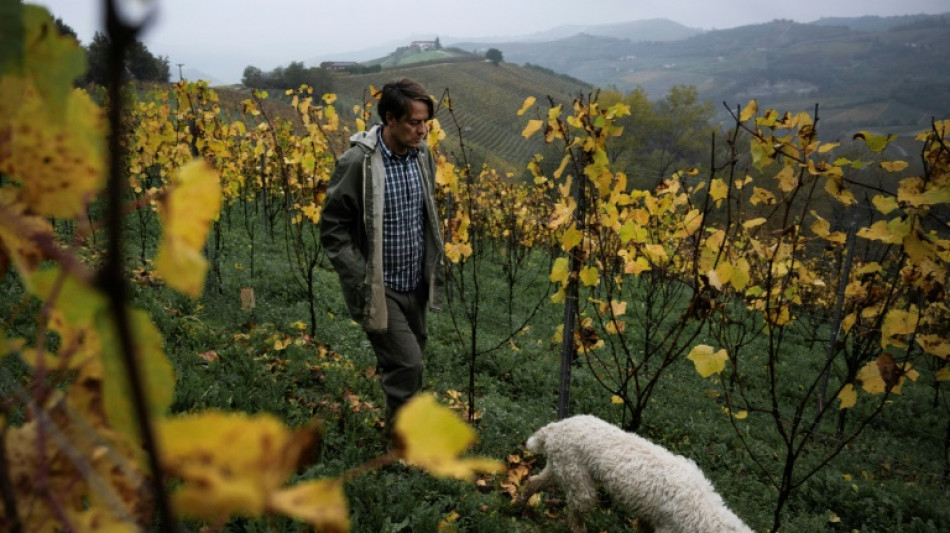

White truffles, Italy's gold, menaced by climate change
Deep in a thick forest in Italy's northwestern Piedmont region, the hunt is on for the white Alba truffle, with excited dogs zigzagging and digging into the wet earth.
But the culinary treasure is becoming increasingly rare, undermined by climate change.
"Go find it! Where is it?" Carlo Marenda, a part-time truffle hunter, calls out to Gigi and Buk, seven month- and 13-year-old crosses between the Spinone Italiano and Lagotto Romagnolo breeds, prized for their keen sense of smell.
Autumn leaves crunch under the weight of boots sinking into muddy soil. Below a picturesque hillside vineyard not far from Alba, trails wind along the Rio della Fava, crossing damp ground ideal for growing truffles.
Sought after by gourmets and starred chefs around the globe, the white truffle of Alba, the most prestigious in the world, is an underground fungus growing in symbiosis with certain hardwood trees by attaching itself to their roots.
Its intense and refined scent, a mixture of hay, garlic and honey, allows hunting dogs to detect it, even if the truffle is sometimes buried up to a metre deep.
Introduced to truffle hunting at the age of five by a family friend, Carlo Marenda, 42, founded the "Save the Truffle" association in 2015, alongside Edmondo Bonelli, a researcher in natural sciences.
It was an octogenarian "trifulau" loner, Giuseppe Giamesio, known as "Notu" and the last descendant of a family with a century-old truffle tradition, who revealed his secrets to him and bequeathed his dogs just before his death in 2014.
The master's message was a testament: "If we want to prevent the disappearance of the truffle, we must protect the forests, stop polluting the waterways and plant new 'truffle' trees".
Ten years later, thanks to donations and the support of some winegrowers, the association has planted more than 700 such trees in the hilly Langhe area, including poplars, oaks and lindens.
- Notu's legacy -
"Notu passed on to me his passion for truffle hunting and tree preservation," said Marenda, emerging from his metallic grey Fiat Panda 4X4, the preferred car of truffle hunters.
In the last three decades, the areas dedicated to white truffles in Italy have dropped by 30 percent, gradually giving way to more profitable vineyards, but also hazelnut groves.
The Langhe hills provide a large quantity of hazelnuts to the chocolate giant Ferrero, which was founded in 1946 in Alba, a small prosperous town of 30,000 inhabitants.
But the main threat to the white truffle, whose harvest was classified as an intangible heritage of humanity by UNESCO in 2021, is climate change.
Global warming, drought, deforestation and sudden temperature changes are all factors weakening the natural habitat of this fungus.
To survive, the truffle needs cold and humidity. At the beginning of November, however, the temperature was at 20 degrees Celsius (68 degrees Fahrenheit).
"With the prolongation of summer weather, production is definitely falling", he lamented.
- Soaring prices -
The harvest, running from October to the end of January, is getting shorter. And with the delayed cold and snow to arrive, "the aroma of the truffles is not yet 100 percent and they don't keep as long", Marenda said.
Abundant rain, as seen in recent weeks, can also be harmful, he said.
"If there is too little water, the truffle does not grow. If there is too much, it rots."
Alerted by Buk, Marenda crouched down to the ground to delicately scratch the earth with a narrow spade, extracting a truffle, albeit rather modest in size.
On whether the white truffle is on the brink of extinction, experts say it isn't too late.
"Not yet. But if we don't act, it could become so," said Mario Aprile, president of the Piedmont truffle hunters' association.
"The white truffle cannot be cultivated, unlike the black one. Without trees, there are no truffles. We plant them to rebuild biodiversity," Aprile said.
Faced with limited supply and booming demand, the white truffle is trading at a high price, reaching 4,500 euros per kilo this year at the International Alba White Truffle Fair which ends December 8.
Two "twin" white truffles, bound to the same root and dug up by Aprile, were the stars of the annual world charity auction for white truffles in Alba Sunday.
Weighing a total of 905 grams (2 lbs), the fungi were sold for 140,000 euros ($150,000) to a Hong Kong finance tycoon.
T.Gruber--MP



